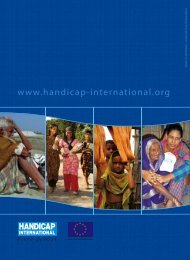Full page photo print - Harvard Law School Project on Disability
Full page photo print - Harvard Law School Project on Disability
Full page photo print - Harvard Law School Project on Disability
You also want an ePaper? Increase the reach of your titles
YUMPU automatically turns print PDFs into web optimized ePapers that Google loves.
chAPTeR 13: The RighT To edUcATi<strong>on</strong><br />
Un c<strong>on</strong>venti<strong>on</strong> <strong>on</strong> the Rights of Pers<strong>on</strong>s with disabilities<br />
Article 24, Right to educati<strong>on</strong>:<br />
1. States Parties recognize the right of pers<strong>on</strong>s with disabilities to educati<strong>on</strong>. With a view to<br />
realizing this right without discriminati<strong>on</strong> and <strong>on</strong> the basis of equal opportunity, States Parties<br />
shall ensure an inclusive educati<strong>on</strong> system at all levels and life l<strong>on</strong>g learning directed to:<br />
a) The full development of human potential and sense of dignity and self-worth, and the<br />
strengthening of respect for human rights, fundamental freedoms and human diversity;<br />
b) The development by pers<strong>on</strong>s with disabilities of their pers<strong>on</strong>ality, talents and creativity,<br />
as well as their mental and physical abilities, to their fullest potential;<br />
c) Enabling pers<strong>on</strong>s with disabilities to participate effectively in a free society.<br />
2. In realizing this right, States Parties shall ensure that:<br />
a) Pers<strong>on</strong>s with disabilities are not excluded from the general educati<strong>on</strong> system <strong>on</strong> the basis<br />
of disability, and that children with disabilities are not excluded from free and compulsory<br />
primary educati<strong>on</strong>, or from sec<strong>on</strong>dary educati<strong>on</strong>, <strong>on</strong> the basis of disability;<br />
b) Pers<strong>on</strong>s with disabilities can access an inclusive, quality and free primary educati<strong>on</strong> and<br />
sec<strong>on</strong>dary educati<strong>on</strong> <strong>on</strong> an equal basis with others in the communities in which they live;<br />
c) Reas<strong>on</strong>able accommodati<strong>on</strong> of the individual’s requirements is provided;<br />
d) Pers<strong>on</strong>s with disabilities receive the support required, within the general educati<strong>on</strong> system,<br />
to facilitate their effective educati<strong>on</strong>;<br />
e) Effective individualized support measures are provided in envir<strong>on</strong>ments that maximize<br />
academic and social development, c<strong>on</strong>sistent with the goal of full inclusi<strong>on</strong>.<br />
3. States Parties shall enable pers<strong>on</strong>s with disabilities to learn life and social development skills<br />
to facilitate their full and equal participati<strong>on</strong> in educati<strong>on</strong> and as members of the community. To<br />
this end, States Parties shall take appropriate measures, including:<br />
a) Facilitating the learning of Braille, alternative script, augmentative and alternative modes,<br />
means and formats of communicati<strong>on</strong> and orientati<strong>on</strong> and mobility skills, and facilitating<br />
peer support and mentoring;<br />
b) Facilitating the learning of sign language and the promoti<strong>on</strong> of the linguistic identity of the<br />
deaf community;<br />
c) Ensuring that the educati<strong>on</strong> of pers<strong>on</strong>s, and in particular children, who are blind, deaf<br />
or deafblind, is delivered in the most appropriate languages and modes and means of<br />
communicati<strong>on</strong> for the individual, and in envir<strong>on</strong>ments which maximize academic and<br />
social development.<br />
4. In order to help ensure the realizati<strong>on</strong> of this right, States Parties shall take appropriate<br />
measures to employ teachers, including teachers with disabilities, who are qualified in sign<br />
language and/or Braille, and to train professi<strong>on</strong>als and staff who work at all levels of educati<strong>on</strong>.<br />
Such training shall incorporate disability awareness and the use of appropriate augmentative<br />
and alternative modes, means and formats of communicati<strong>on</strong>, educati<strong>on</strong>al techniques and<br />
materials to support pers<strong>on</strong>s with disabilities.<br />
5. States Parties shall ensure that pers<strong>on</strong>s with disabilities are able to access general tertiary<br />
educati<strong>on</strong>, vocati<strong>on</strong>al training, adult educati<strong>on</strong> and lifel<strong>on</strong>g learning without discriminati<strong>on</strong><br />
and <strong>on</strong> an equal basis with others. To this end, States Parties shall ensure that reas<strong>on</strong>able<br />
accommodati<strong>on</strong> is provided to pers<strong>on</strong>s with disabilities.<br />
PART 2: The c<strong>on</strong>venTi<strong>on</strong> <strong>on</strong> The RighTs of PeRs<strong>on</strong>s wiTh disAbiliTies<br />
165




